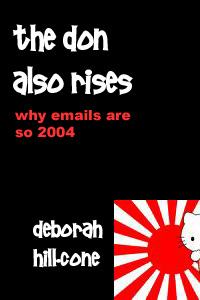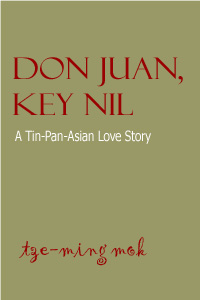If the least expectation you have of a politician is that he or she not speak about him or herself in the third person, then look away for a moment as I relate the words of John Key delivering his inaugural speech today as leader of the National Party.
On many occasions I have read in the media that John Key did a good job against Michael Cullen at the last election, that John Key knows his stuff on finance, but that no one knows what John Key really stands for.
David Slack found this a little unnerving, but David Slack kept reading, and a few minutes later, he found himself at the end of the oration thinking to himself: how would this sound if I ran it through the DuckSpeak machine?
Loyal readers may recall that I once set up a little program that would parse a piece of writing for its DuckSpeak, substituting QUACKS for portions of the sentences that were mostly or entirely meaningless. This was in homage to the genius of Mr Orwell.
My first disappointment was to discover that this was a good example of one of these projects David Slack begins but does not complete. It works, but imperfectly: it won't process the whole speech. I see a use for this machine, so I will return to it.
Nonetheless, I hold to my thesis: this was a script shot through with good intention and generality and, well, just so much Duck Speak.
My mission is to raise people's sights, to be fearless and imaginative in policies that encourage people to set their aspirations higher."
Well, you know, motherhood, apple pie, quack, quack, quack. Where are you going to find a politician to rail at the preposterous suggestion that people's sights should be raised higher? Even Prince Charles tried to cover his tracks on that on.
A little of this flannel is stylistically understandable, but very little of the speech was any less general and uncontroversial, although perhaps he was drawing on his acute trader's instinct to outflank Labour with the remarkable proposition that
The tyranny of distance is reducing, with a billion people now having access to the Internet. The growing economic powerhouses of the world - China and India - are located, if not in our backyard, then in our street. New Zealand businesses have access to the world.
The vice chairman of the party's obsequious talking points division, holidaying in the British Isles, was quickly on the laptop declaring it to be "a very good speech," but I must regretfully disagree.
Here's a little test. The following phrases are drawn from Key's speech today, and Helen Clark's conference speech last month.
See if you can identify which comes from which:
1. A government I lead will have fair policies that encourage enterprise and hard work, and trusts people to get on with their lives and make the best choices for themselves.
2. To meet the aspirations of our peoples: aspirations for a fair deal and opportunity, aspirations for security.
3. The goalposts keep shifting, and we have to keep scoring.
4. I do not intend to blindly follow an ideological path without ever challenging the concept or considering its appropriateness in our unique New Zealand setting.
5. We have to be ambitious for our country and our people in a world which is challenging, but also full of opportunity for the fast and nimble. That must be New Zealand.
6. Building our nation's confidence, instilling a real pride and a sense of what it is that binds us together as New Zealanders, striving for excellence, and ensuring we use our past successes as a bridge to even greater achievements.
7. I am ambitious for New Zealand and I want New Zealanders to be ambitious for themselves.
8. Developing a qualitatively different economy, which is producing high value goods and services the world will pay a premium for.
9. You can measure a society by how it looks after its most vulnerable.
10. It is in the interests of no one, and to the shame of us all, that an under-class has been allowed to develop in New Zealand.
11. Pushing for more effective commercialisation of the innovations coming out of our science and research sectors.
12. New Zealand has high rates of imprisonment and high rates of recidivism. I draw only one conclusion from that : the system isn't working.
13. When people think of New Zealand, I want them to think of a nation whose peoples are all respected and valued, and where we live in peace with each other.
Quack. You'll find the answers at the foot of this post.
It's all very well to say something like this:
The government, of course, has an important role to play in the modern economy. But the appropriate role for the government is in the background, not in the foreground. We need to improve the regulatory and institutional conditions under which firms operate, and then step back and let them establish, grow, export and hire staff.
But next time Liane Dalziel turns up to speak at your Rotary lunch, ask yourself if the speech sounds different in any meaningful way.
Of course, John Key's mileage may vary. Perhaps he envisions a government that spends closer to 25% of GDP than 40.
It doesn't sound as though he wants to get government so small you could drown it in a bathtub (which was always the suspicion about Don acting as the CEO of ACT's reverse takeover) so a number like 15 or 20 seems unlikely, but really: pick a number, John, any number and get specific. Then we'll know what we're talking about beyond the broad motherhood and apple pie declarations of good intentions.
As it happens, you will find considerable specificity to amplify the broad propositions in the Clark speech from which the foregoing quotes were drawn. You can't duck it. Some specificity, even just the slightest amount, is still necessary in one of these "30,000-feet" speeches as they call them in the world of PowerPoint presentations.
Significantly there is one note of this kind near the end of Key's speech, and at that point one gets the sense both of the dealing room ankle-tapper and also the political novice.
It is a mystery to me why the political Left acts as if it has a monopoly on environmental policies, when it is obvious to anyone who cares to look that all of us, across the political spectrum, with the exception perhaps of the Greens, have taken too long to put the protection of our environment at the forefront of our thinking.
Oh really? I have a box of speeches I churned out for the Minister of the Environment at the end of the 1980s that would suggest otherwise. He chose to keep that portfolio when he became Prime Minister because, he told the media, environmental policy was "so crucial". They were talking about climate change a long,long time before Key and his colleagues were bagging the Kyoto Protocol.
For the most part, though, specifics are not to be found, and this is unfortunate for an aspiring Prime Minister, because it tends to dull the lustre of his vision. In the absence of something to latch on to, you have the appearance of floundering, or, possibly, courting the job for its own sake.
If you don't have a dream of the kind that paints some clear kind of picture, that imagines for example, that little black boys and little black girls will be able to join hands with little white boys and white girls, you don't really have a "dream" of any great appeal.
All you have are aspirations going forward.
******************************
Phrase Owners
1 Key
2 Clark
3 Clark
4 Clark
5 Clark
6 Key
7 Key
8 Clark
9 Key
10 Key
11 Clark
12 Clark
13 Clark








